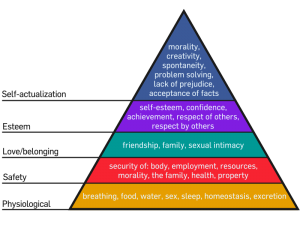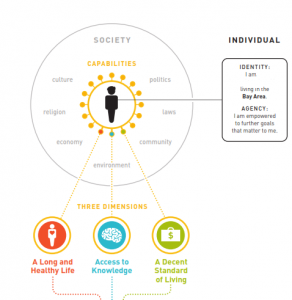Hello tout le monde! Aujourd’hui j’aimerais faire de la pub pour mon ami Mr Nénénieur qui a accepté d’écrire un article pour Robin de Brousse. 
Cet article a été publié sur le blog de Nénénieur qui est accessible ici.
Nénénieur a une vision particulière du développement : il pense que la technologie est un facteur important pour réduire les inégalités entre le Nord et le Sud. Il a commencé un blog Innovation Tales qui présente une vision futuristique mais très sensée du développement.
Merci Nénénieur et bonne lecture les amis!
Prelude:
It started with a cause, a bunch of students protesting again the increase of school fees. I remember, it was a warm Saturday of April. The students of the Buea University were on the street, trying to get the voices heard. Cloud computing was supposed to make their lives easier, giving them access to technology and better education services trough some remote centers. What was foreseen as a social revolution in the country, turned out to be a gold opportunity for internet service providers. Before Internet, attending schools was not accessible to everyone but still with gratuity of school fees imposed by the State, people were able to get their college degrees at least before dropping. These days were now gone, quality education was over the internet; State was not investing in schools any more. Most of them were transformed into shelters for homeless, if not destroyed for the sake of cities aesthetics. People attended virtual classes from home, trough their computers and a fast internet connection that even allowed remote help from holographic tutors. The State has invested massively in network infrastructure, built an optical fiber backbone that connects every single city in the country with the outer World: Information Society, was the buzz word on every lips. But at what cost 1000 $ Francs was giving you access to one unlimited month of educational services over the web. Not everyone would afford it and what we all feared happened. After a decade of e-learning, a revolution started led by the virtual students. The internet providers’ offices were ransacked, the constitutional state was overthrown and the pirates party took over the country. I remember this like if it was yesterday, I remember entering the senate has the new president of the country, I was young, I was fool, I was a hacker.
The Digital Divide

The gap between the developed world and developing economies was long observed in terms of Gross Domestic Production (economic growth theory). But today another type of pit is creating distances between realities: the digital divide, a frontier between the poor and the rich. In some villages around Africa, the need for electricity and other basic necessities has transformed Internet into a fantasy; a distant dream that comes true only when the villages get visits from scientists, NGO or other expedition corps usually operating in remote rural areas.
Maslow was right

- Maslows hierarchy of needs
Even if these people get access to a solar-powered laptop and a satellite Internet connection will they use Internet as a tool to develop their knowledge about the world or to entertain their selves? Will they care about Facebook, Twitter, Pinterest and other social networks? In their realities, the ”true and physical” social network they formed, has long struggled to be part of a country that moves without them. Maslow’s hierarchy of needs tell us that needs have to be filled one after the other, in order for humans to climb the pyramidal ladders of societies. Physiological needs first (access to food, proper housing among others) are a pre-requisites to Safety (job security for example). Social groups turns out to be an intermediate level before the top of the pyramid (Love/Belonging). That aspect of the new information society built around social networks is sometimes ignored but should be taken in consideration.
What we should really learn from Silicon Valley

- Image from the report A Portrait of California
As a shift from traditional trade/consumption economy to a services/functionality economy is on-going, Economic Development becomes a better model than economic growth since it takes in account external negativity. In 2009, the study report A Portrait of California was released by the American Human Development Project, providing an interesting outlook of what has become the sunny state of the years. Based on the study, Californians are enjoying levels of well-being and access to opportunity the U.S. nation will not reach until the 2060s, with a score of 9.35 over 10 on the Human Development Index scale. Silicon Valley shines in the report with its population’s 86.7 years life expectancy, 100% school enrolment, 69% bachelor degree and median earnings at 55772 $US. So it is not only the most innovative place on earth, but also a place where quality of life has reached very high standards. The report shows a direct correlation between innovation and HDI, since people who have access to proper quality of life are able to undertake new challenges, becoming more innovating and making more impact on their society.
Elite Society: Facebook, Twitter and Pinterest
Today’s social networks have been adopted not only by those who have access to an internet connection, but mainly by people who are in need of social inclusion. People with a good quality of life and who have secured physiological needs already. These social networks are creating a virtual elite society that surfs on the waves of the modern Internet, ubiquitously checking into places and sharing life experiences in real-time. Things that do not matter for some folks in poor remote rural areas and who have to wake up early in the morning to fetch water and wood or work the lands with minimum tools.
Building the true Internet Society
The Digital Divide is not only about network connectivity and access to fast internet speeds. It is also about bringing people from low levels of Maslow’s Hierarchy all the way to the top. It is an Herculean work that should be taken on the social front to give these people proper housing, clean water, electricity, education among other basic needs. Access to the Information Society is not only giving opportunity to people to share their status on Facebook, it is also about transforming the society by eliminating poverty; improving citizens’ daily lives and giving them opportunity to take control on their lives.
Parallel World:
New Moungo has been on the radar these days. The cluster project launched a decade ago by the Cameroonian government is a dream that has come true. A modern city built from scratch, where schools, hospitals, proper housing, public safety and employment programs are granted to everyone. At the beginning, the state had many issues convincing major companies to invest into the project, but the quality of Cameroon’s diaspora human workforce was the trigger. Thousands of immigrants returned home, using their skills to serve domestic or international companies that invested massively into the project by creating campus and offices in the area. Today, it is a major innovation hub in Africa, a close clone to Sophia-Antipolis, Silicone Valley, Smart Village other clusters around the world. A place were, quality of life is combined with technology to create sustainable innovations for the country and the world. A place that shines and counts.



